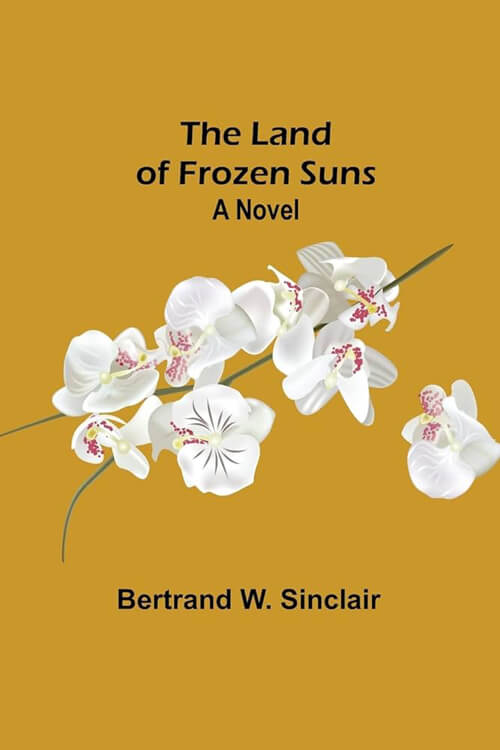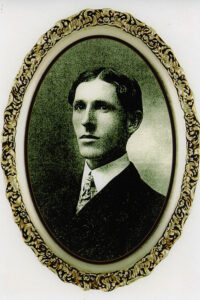
The Land of Frozen Suns
Who was it, I wonder, who made that sagacious remark about the road to hell being paved with good intentions? He might have added an amendment to the effect that there’s always a plentiful supply of material for that much-traveled highway. We all contribute, more or less. I know I have done so. And so did my people before me. My father’s intentions were good, but he didn’t live long enough to carry them out. If he hadn’t fallen victim to an inborn streak of recklessness, a habit of taking chances,—well, I can’t say just how things would have panned out. I’m not fatalist enough to believe that we crawl run or soar through our allotted years according to some prearranged scheme that we are powerless to modify. Oh, no! It’s highly probable, however, that if my father and mother had lived I should have gone into some commercial pursuit or taken up one of the professions. Either way, I should likely have pegged along in an uneventful sort of way to the end of the chapter—lots of men do. Not that I would have taken with enthusiasm to chasing the nimble dollar for the pure love of catching it, but because I was slated for something of the sort, and as the twig is bent so is the tree inclined; a man can’t sit down and twiddle his thumbs and refuse to perform any useful act, because there is no glory in it. The heroic age has gone a-glimmering down the corridors of time.
As it happened, my feet were set in other paths by the force of circumstances. Only for that the sage-brush country, the very place where I was born might have remained a terra incognita. I should always have felt, though, that I’d missed something, for I was ushered into this vale of tears at the Summer ranch on the Red River of the South. Sumner here hadn’t developed into a cow monarch those days, but he was on the way. My earliest impressions were all of the log and ’dobe buildings, of long-horned cattle, of wild, shaggy-maned horses, and of wilder men who rode the one and drove the other in a masterly fashion. For landscape there was rolling prairie, and more rolling prairie beyond; and here and there the eternal brown of it was broken by gray sage-grown flats and stretches of greasewood—as if Nature had made a feeble effort to break the monotony. I knew only this until I was big enough to tease for a pony. I cannot remember seeing a town when I was small. The world to me was a place of great plains, very still, and hot, and dry, a huddle of cabins, and corrals, and a little way to the south Red River slinking over its quicksands—except in time of storm; then it raged.
Read or download Book
Bertrand W. Sinclair
Bertrand William Sinclair (1881–1972) was a Canadian novelist known for a series of westerns set in the United States, and also for a series of novels set in his home province of British Columbia.
Biography.
Sinclair was born 9 Jan 1881 in Edinburgh, Scotland, U.K. He was the son of George Bertrand and Robina (Williamson) Sinclair. His name at birth was William Brown Sinclair, but he changed it, adopting his father’s middle name as his first name. He emigrated to Canada with his mother in 1889.
At age 14 Sinclair ran away to Montana and became a cowboy for the next seven years. In 1903 he left Montana for Seattle and San Francisco, but returned to Montana, living in Great Falls for the next three years. In 1905 he first published stories. Also in 1905, he married author Bertha M. Brown, better known under her pen name (using her first husband’s last name): B. M. Bower. Bower, a very prolific novelist, taught him to write “productively” and to employ a formula. Sinclair and B. M. Bower had one daughter.
By 1908 Sinclair and Bower had moved to Santa Cruz, California. They divorced in 1912. The same year, Sinclair married his first wife’s cousin, Ruth Isabelle Miner. They had a child in 1912, a daughter. The Sinclairs moved to Vancouver, B.C., ultimately settling in Pender Harbour. Sinclair lived in Pender Harbour until his death.
Sinclair’s first series of work took place in Montana. Sinclair had disapproved of previous westerns he had read because he felt the action portrayed was far different from the lives cowboys led. When he moved to Vancouver, the settings of his works changed (except for two very late Westerns). He tended to write about social causes and worked in the timber industry before writing Big Timber. Later, before writing about the fishing industry, he worked as a commercial fisherman and then wrote Poor Man’s Rock. Later in life, from 1936 to 1966, he worked full-time as a licensed commercial fisherman.
In writing about the outdoors, Sinclair was influenced in his portrayals by Jack London. In his works treating social causes, he was influenced by Upton Sinclair, who may have been a cousin.
Over the years 1905-40 Sinclair wrote over 60 stories and 11 “novelettes”.






